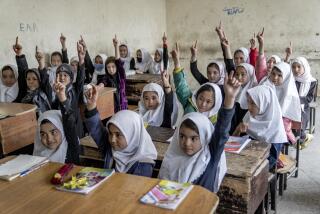Afghan Women Still Being Persecuted, Activists Report
Women in Afghanistan face a growing wave of human rights abuses in the western city of Herat, where talking to strange men can cause them to be subjected to practices such as chastity examinations, according to a report released Monday.
The report by Human Rights Watch said the restrictions imposed on women in the province of Herat under Gov. Ismail Khan, a former militia leader, recall the severe dictates of the Islamic fundamentalist Taliban regime.
The report said Herat is not the only Afghan region where women and girls face intimidation. In five other provinces, it said, schools for girls have been attacked with rockets or set on fire. Taliban-era restrictions are being imposed by other regional authorities, who ban music or impose the head-to-toe burka on women, it said. Female students have reportedly been threatened by armed men on their way to school.
“While western Afghanistan is perhaps the worst of what’s happening to women and girls, it’s hardly unique,” said Zama Coursen-Neff, a coauthor of the report. “There is growing repression of women and girls in Afghanistan. It’s mostly men with guns deciding what’s going to happen with women and girls.”
The report found that the rights of women and girls in the city of Herat improved after the fall of the Taliban, with many returning to school or jobs. But the advances were met by the social policing of girls and women.
The Herat government encourages even schoolboys to spy on girls and women and report “un-Islamic” behavior, such as walking unaccompanied at night, the report said.
It said Herat police have stopped and questioned women found alone with men -- even the drivers of taxicabs -- and arrested those who were not related. Police bring the men to jail but take women to a hospital for exams to determine whether they have had sex recently or, if they are single, whether they are virgins, the report said. Girls deemed improperly veiled have been beaten.
The report called on the United States to halt military and other assistance to independent leaders such as Khan and to pressure Afghan regional governments to repeal any decrees that restrict or degrade women.
It called on international forces to station peacekeepers outside the capital and for the United Nations to expand human rights monitoring in provincial Afghanistan. It urged international donors to support Afghan women’s groups.
Coursen-Neff pointed out that the Bush administration cited the abuse of women in its effort to build support for military action against the Taliban.
“I think a lot of people outside of Afghanistan think Afghan women have regained many of the rights they lost under the Taliban,” she said. “The international community has not delivered on its promise to Afghan women.”
More to Read
Sign up for Essential California
The most important California stories and recommendations in your inbox every morning.
You may occasionally receive promotional content from the Los Angeles Times.










